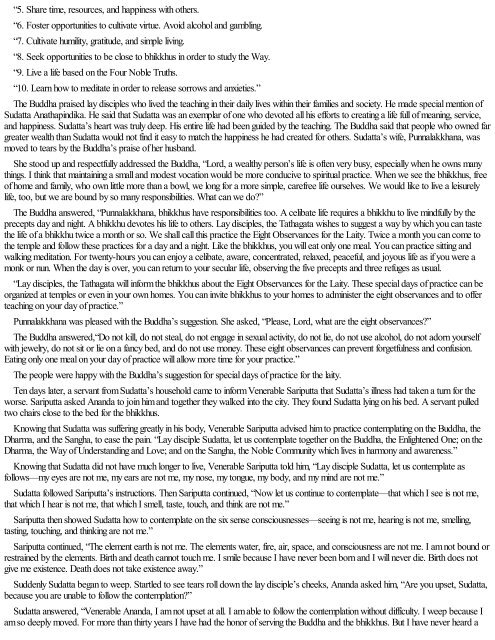old-path-white-clouds-thich-nhat-hanh
old-path-white-clouds-thich-nhat-hanh
old-path-white-clouds-thich-nhat-hanh
Create successful ePaper yourself
Turn your PDF publications into a flip-book with our unique Google optimized e-Paper software.
“5. Share time, resources, and happiness with others.<br />
“6. Foster opportunities to cultivate virtue. Avoid alcohol and gambling.<br />
“7. Cultivate humility, gratitude, and simple living.<br />
“8. Seek opportunities to be close to bhikkhus in order to study the Way.<br />
“9. Live a life based on the Four Noble Truths.<br />
“10. Learn how to meditate in order to release sorrows and anxieties.”<br />
The Buddha praised lay disciples who lived the teaching in their daily lives within their families and society. He made special mention of<br />
Sudatta Anathapindika. He said that Sudatta was an exemplar of one who devoted all his efforts to creating a life full of meaning, service,<br />
and happiness. Sudatta’s heart was truly deep. His entire life had been guided by the teaching. The Buddha said that people who owned far<br />
greater wealth than Sudatta would not find it easy to match the happiness he had created for others. Sudatta’s wife, Punnalakkhana, was<br />
moved to tears by the Buddha’s praise of her husband.<br />
She stood up and respectfully addressed the Buddha, “Lord, a wealthy person’s life is often very busy, especially when he owns many<br />
things. I think that maintaining a small and modest vocation would be more conducive to spiritual practice. When we see the bhikkhus, free<br />
of home and family, who own little more than a bowl, we long for a more simple, carefree life ourselves. We would like to live a leisurely<br />
life, too, but we are bound by so many responsibilities. What can we do?”<br />
The Buddha answered, “Punnalakkhana, bhikkhus have responsibilities too. A celibate life requires a bhikkhu to live mindfully by the<br />
precepts day and night. A bhikkhu devotes his life to others. Lay disciples, the Tathagata wishes to suggest a way by which you can taste<br />
the life of a bhikkhu twice a month or so. We shall call this practice the Eight Observances for the Laity. Twice a month you can come to<br />
the temple and follow these practices for a day and a night. Like the bhikkhus, you will eat only one meal. You can practice sitting and<br />
walking meditation. For twenty-hours you can enjoy a celibate, aware, concentrated, relaxed, peaceful, and joyous life as if you were a<br />
monk or nun. When the day is over, you can return to your secular life, observing the five precepts and three refuges as usual.<br />
“Lay disciples, the Tathagata will inform the bhikkhus about the Eight Observances for the Laity. These special days of practice can be<br />
organized at temples or even in your own homes. You can invite bhikkhus to your homes to administer the eight observances and to offer<br />
teaching on your day of practice.”<br />
Punnalakkhana was pleased with the Buddha’s suggestion. She asked, “Please, Lord, what are the eight observances?”<br />
The Buddha answered,“Do not kill, do not steal, do not engage in sexual activity, do not lie, do not use alcohol, do not adorn yourself<br />
with jewelry, do not sit or lie on a fancy bed, and do not use money. These eight observances can prevent forgetfulness and confusion.<br />
Eating only one meal on your day of practice will allow more time for your practice.”<br />
The people were happy with the Buddha’s suggestion for special days of practice for the laity.<br />
Ten days later, a servant from Sudatta’s househ<strong>old</strong> came to inform Venerable Sariputta that Sudatta’s illness had taken a turn for the<br />
worse. Sariputta asked Ananda to join him and together they walked into the city. They found Sudatta lying on his bed. A servant pulled<br />
two chairs close to the bed for the bhikkhus.<br />
Knowing that Sudatta was suffering greatly in his body, Venerable Sariputta advised him to practice contemplating on the Buddha, the<br />
Dharma, and the Sangha, to ease the pain. “Lay disciple Sudatta, let us contemplate together on the Buddha, the Enlightened One; on the<br />
Dharma, the Way of Understanding and Love; and on the Sangha, the Noble Community which lives in harmony and awareness.”<br />
Knowing that Sudatta did not have much longer to live, Venerable Sariputta t<strong>old</strong> him, “Lay disciple Sudatta, let us contemplate as<br />
follows—my eyes are not me, my ears are not me, my nose, my tongue, my body, and my mind are not me.”<br />
Sudatta followed Sariputta’s instructions. Then Sariputta continued, “Now let us continue to contemplate—that which I see is not me,<br />
that which I hear is not me, that which I smell, taste, touch, and think are not me.”<br />
Sariputta then showed Sudatta how to contemplate on the six sense consciousnesses—seeing is not me, hearing is not me, smelling,<br />
tasting, touching, and thinking are not me.”<br />
Sariputta continued, “The element earth is not me. The elements water, fire, air, space, and consciousness are not me. I am not bound or<br />
restrained by the elements. Birth and death cannot touch me. I smile because I have never been born and I will never die. Birth does not<br />
give me existence. Death does not take existence away.”<br />
Suddenly Sudatta began to weep. Startled to see tears roll down the lay disciple’s cheeks, Ananda asked him, “Are you upset, Sudatta,<br />
because you are unable to follow the contemplation?”<br />
Sudatta answered, “Venerable Ananda, I am not upset at all. I am able to follow the contemplation without difficulty. I weep because I<br />
am so deeply moved. For more than thirty years I have had the honor of serving the Buddha and the bhikkhus. But I have never heard a


